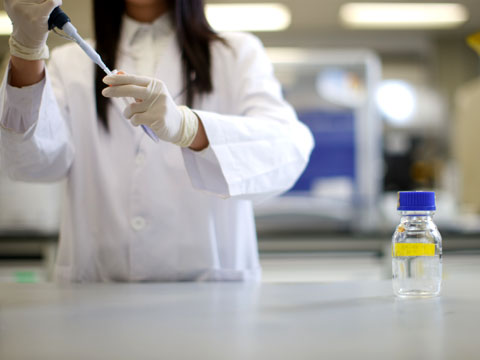- Department of Anaesthesiology
- Department of Clinical Oncology
- Department of Diagnostic Radiology
- Department of Family Medicine and Primary Care
- Department of Medicine
- Department of Microbiology
- Department of Obstetrics and Gynaecology
- Department of Ophthalmology
- Department of Orthopaedics and Traumatology
- Department of Paediatrics and Adolescent Medicine
- Department of Pathology
- Department of Pharmacology and Pharmacy
- Department of Psychiatry
- Department of Surgery
- School of Biomedical Sciences
- School of Chinese Medicine
- School of Nursing
- School of Public Health
- Molecular Chinese Medicine Laboratory
- Emergency Medicine Unit
Research Achievements

The LKS Faculty of Medicine is home to some of the best biomedical scholars in the world. With a strong research base, the Faculty has made tremendous contributions to the study and treatment of various diseases.
High Impact Publications
According to Clarivate Analytics, our researchers have published 297 Highly Cited Papers, and 4 staff members are listed as Highly Cited Researchers. 52 of the Faculty's researchers (i.e. nearly 1 in 8 professors) rank among the top 1% in their field in terms of citation and recognition.
The Faculty's research is published in a number of prestigious journals, including over 48 high impact publications in top international journals in 2019 and 2020. A list of recent high impact publications can be found at https://www.med.hku.hk/en/research/high-impact-publications.
Highlights of Research Achievements
Cardiometabolic Diseases and Healthy Aging
- Leading research on adipokines and adipose-derived hormones.
- Research on metabolic diseases: discovered novel biomarkers for risk prediction and drug development in prevention and management of diabetes mellitus, obesity, cardiovascular diseases and thyrotoxic periodic paralysis.
- Pioneered cell-based therapy in the treatment of human heart diseases.
- Homoharringtonine (omacetaxine mepesuccinate) as an adjunct for FLT3-ITD acute myeloid leukaemia. (Sci Transl Med. 2016)
Cancer
- Developed an oral arsenic preparation to treat leukaemia, the first patented prescription drug developed entirely in Hong Kong.
- Identified and characterised cancer stem cells responsible for metastasis in colorectal cancer, and the development of liver cancer.
- Discovered a new mechanism causing Lynch Syndrome that has become a diagnostic test adopted worldwide.
- Established zebrafish as a model organism for acute myeloid leukaemia (AML) and identified novel therapeutic regimens for specific AML subtypes that improve patient outcomes.
- Hepatitis B virus infection and hepatocellular carcinoma: [Discovered? Contributed to??] from diagnosis and treatment of chronic carrier status, mechanisms of hepatocellular carcinogenesis, to development of novel treatment modalities including live-donor liver transplantation.
- Groundbreaking and comprehensive genomic study of gastric and liver cancers.
Emerging Infectious Diseases
- Discovered the SARS coronavirus in 2003; pivotal in the fight against SARS.
- Leading infectious diseases research and advancing the frontier in the study of human and animal influenzas (poultry, swine, wild birds, and camels), coronavirus (SARS, H5N1, H7N9, MERS, and COVID-19), and other emerging viruses.
- Infectious disease epidemiology: provides critical insights into influenza transmission in the community; effectiveness and impact of control measures; modes of transmission of viruses; vaccination effectiveness; immunity to infections; mathematical models to assess the potential benefits and resource requirement of mitigation and surveillance strategies.
Stem Cell, Development and Regenerative Medicine
- Critical insights into the disease mechanisms of premature ageing, deafness, and digit development, through functional genomics and genetics.
- Produced the world's first two expanded potential stem cells from human embryos, improving our understanding of human embryo development and paved the way for novel cell therapy.
- Developed new technology (expanded potential stem cell) in stem cell research and development of regenerative medicine.
- Discovered genetic risk factors for common and rare skeletal disorders leading to the discovery of potential drug targets to correct or stop developmental and degenerative disorders.
- Generated successfully human-induced pluripotent stem cell lines for modelling of different human diseases, such as premature cardiovascular diseases.
- Generation of a mouse model to provide new insights into the development and formation of joints.
- Genetic and sequence analyses in the identification of a novel risk factor linked to degeneration of the spine and back pain
State Key Laboratories
The Faculty currently has four State Key Laboratories (SKLs) recognised by the Ministry of Science and Technology, which partner with and work closely alongside SKLs in Mainland China.
- State Key Laboratory for Emerging Infectious Diseases (The first State Key Laboratory located outside Mainland China)
- State Key Laboratory for Liver Research
- State Key Laboratory of Pharmaceutical Biotechnology
- State Key Laboratory of Brain and Cognitive Sciences (co-host with HKU Faculty of Social Sciences)
WHO Collaborating Centre for Infectious Disease Epidemiology and Control
The School of Public Health has been designated as a WHO Collaborating Centre for Infectious Disease Epidemiology and Control. The designation of HKU School of Public Health as a WHO CC is the first of such kind at the University.
WHO H5 Reference Laboratory
The Centre of Influenza Research at HKU is one of 12 laboratories worldwide designated as a WHO H5 reference laboratory. Its mandate is to provide international reference laboratory services and training on H5 and other animal influenza viruses with zoonotic potential, to provide WHO with data and risk assessment relevant to such zoonotic threats and advice on selection of relevant viruses for pre-pandemic vaccine development.